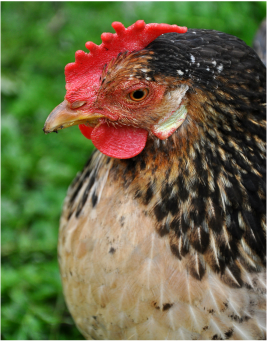The most obvious reason to vaccinate your flock is because vaccinations help your chickens stay healthier and protects them from certain fatal diseases, viruses, and illnesses. Many chicken keepers find out to late often after their chicken is already sick or has a virus or sickness which spreads through the flock and kills their birds or is so bad the birds have to be culled. Had they known that their chickens could be vaccinated to prevent these illnesses most would choose to vaccinate. Many of the worst disease, viruses, or illnesses your chickens can get are contracted from wild birds, rodents, and nearby predators who contaminate the chickens free ranging area, feed, or water.
Why You Need to Vaccinate Your Chickens

"The primary objective of immunizing any poultry flock is to reduce the level of clinical disease and to promote optimal performance. Certain vaccines may also have an impact on human health (i.e. Salmonella vaccines). For breeders – we also want to accomplish some additional goals:
A. Protect the bird (as a pullet and hen) against specific diseases.
B. Protect the progeny of the hen against vertical transmission of disease.
C. Provide passive immunity to progeny".
How Poultry Vaccine's Work
"Depending on the type of antigen in the vaccine, the birds’ immune system will react, creating a “memory” response of antibodies and immune cells. The more a bird is exposed to the same antigen, the greater the antibody response and resulting protection. This is the reason many flocks are vaccinated multiple times for the same disease – to maximize the immune system’s response".
Forms of Poultry Vaccine's
"Vaccines for poultry come in three general forms: Modified or Attenuated (Live), Inactivated (Killed), and Recombinants. Live vaccines are strains that are naturally or genetically modified milder forms of field strains. Inactivated vaccines are whole viruses or bacteria that have been inactivated during production and formulated into an injectable form. Recombinant vaccines are made by using live virus or bacteria as a vector to transport the gene coding for the protective antigen of a second infectious agent for which immunity is desired"(Cobbs). Scroll down to find out more.
A. Protect the bird (as a pullet and hen) against specific diseases.
B. Protect the progeny of the hen against vertical transmission of disease.
C. Provide passive immunity to progeny".
How Poultry Vaccine's Work
"Depending on the type of antigen in the vaccine, the birds’ immune system will react, creating a “memory” response of antibodies and immune cells. The more a bird is exposed to the same antigen, the greater the antibody response and resulting protection. This is the reason many flocks are vaccinated multiple times for the same disease – to maximize the immune system’s response".
Forms of Poultry Vaccine's
"Vaccines for poultry come in three general forms: Modified or Attenuated (Live), Inactivated (Killed), and Recombinants. Live vaccines are strains that are naturally or genetically modified milder forms of field strains. Inactivated vaccines are whole viruses or bacteria that have been inactivated during production and formulated into an injectable form. Recombinant vaccines are made by using live virus or bacteria as a vector to transport the gene coding for the protective antigen of a second infectious agent for which immunity is desired"(Cobbs). Scroll down to find out more.
Reference: http://www.cobb-vantress.com/docs/default-source/management-guides/cobb-vaccination-procedure-guide---englishFCC0CCBF492C3BF8E205233B.pdf?sfvrsn=12.pdf


